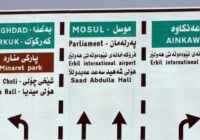Trump’s clearest indication yet of his policy approach toward the Middle East and North Africa was tucked into a recent thank-you speech in Cincinnati.
In a little-noticed thank you speech in Cincinnati, a stop on his tour of battleground states that secured his electoral victory, President-Elect Donald J. Trump recently vowed to break with past United States efforts to “topple regimes and overthrow governments” in the Middle East and North Africa. Trump was likely referring to costly US military interventions in Afghanistan and Iraq that toppled the Taliban and Saddam Hussein but failed to produce stable regimes, while giving half-hearted US support for democracy and the strengthening of civil society.
“Our goal is stability not chaos … We will partner with any nation that is willing to join us in the effort to defeat ISIS [Islamic State] and radical Islamic terrorism … In our dealings with other countries, we will seek shared interest wherever possible and pursue a new era of peace, understanding and goodwill,” Trump said. In effect, the president-elect was reiterating longstanding US policy without the lip service past presidents paid to US values such as democracy, human rights, freedom of speech and freedom of religion.
Traumatic Consequences
It was a policy that backfired with traumatic consequences for the United States. President George W. Bush, in a rare recognition of the pitfalls of decades of US policy in the Middle East and North Africa, acknowledged within weeks of the 9/11 attacks that support for autocratic regimes that squashed all expressions of dissent had created the feeding ground for jihadist groups focused on striking at Western targets.
That was no more true back then than it is today with significantly stepped-up repression across the Middle East fueling civil strife, humanitarian catastrophes, and the expansion of militant and jihadist groups.
If anything, Trump’s seemingly status quo-based, transactional approach to the Middle East and North Africa risks exacerbating the drivers of violence and militancy in the region, and threatens to enmesh his administration in a labyrinth of contradictory pressures.
One lesson that emerges from post-World War II North Africa and the Middle East is that the region will go to any length to ensure that it is a focus of attention. US administrations come to office with lofty goals and ambitions, only to see their agenda driven by acts on the ground in the region. The Trump administration is unlikely to fare any better.
Multiple pitfalls
The pitfalls are multiple, as follows:
1) Syria: Backed by Russia and Iran, Syrian President Bashar al-Assad may be gaining the upper hand in the country’s brutal six-year war, but that is likely to prove a pyrrhic victory. The likelihood of Syria returning territorially and politically to the pre-war status quo ante is nil. Assad’s Alawites, like Syrian Kurds, will not see their safety and security guaranteed by a Syrian state dominated by remnants of the old-regime.
Assad, with a long list of scores to settle, will be damaged goods for whom the knives will be out once the guns fall silent. And that silence will at best be temporary, with foreign forces covertly and overtly continuing to intervene. Not to mention the fallout of an angry, disillusioned generation that has known nothing but brutality, violence and despair and has nothing to lose.
2) Russia: A partnership with Russia may initially reshape Syria, but will be troubled by radically different views of Iran. While Russia backs Iran, Trump has promised to take a harder line toward the Islamic Republic, even if he stops short of terminating the nuclear agreement concluded by the Obama administration and the international community.
3) Islamic State: Bringing Russia on board in a concerted allied effort to destroy the Islamic State (IS) will contribute to depriving the jihadist group of its territorial base in Iraq and Syria, but will do little to help put the two countries back together as nation states. Nor will it address underlying drivers of jihadist violence fueled by disenfranchisement, marginalization, repression, regimes that fail to deliver economic and social goods, and the unilateral rewriting of social contracts.
4) Egypt: Blinded by a focus on the fight against jihadism, support for General-turned-President Abdel Fatah al-Sisi, one of the country’s most repressive rulers, could prove to be an example of the pitfalls of uncritical backing of autocracy as dissatisfaction mounts with failed economic and social policies.
 5) Israel and Palestine: A policy that is less critical of Israeli policy toward the West Bank and Gaza and that moves away from support for the creation of an independent Palestinian state will complicate relations with the Arab and Muslim world. It will also further undermine the pro-peace faction led by President Mahmoud Abbas and strengthen Islamist groups such as Hamas.
5) Israel and Palestine: A policy that is less critical of Israeli policy toward the West Bank and Gaza and that moves away from support for the creation of an independent Palestinian state will complicate relations with the Arab and Muslim world. It will also further undermine the pro-peace faction led by President Mahmoud Abbas and strengthen Islamist groups such as Hamas.
Quintessential Approach
In many ways, Trump represents a quintessential approach toward foreign policy expressed by a US diplomat 40 years ago as he defended autonomy agreed at the time by Israeli Prime Minister Menachem Begin and Egyptian President Anwar Sadat as the response to Palestinian aspirations. Questioned about the viability of the concept, the diplomat said with no consideration of the consequences and cost of failure: “We Americans are very pragmatic. We keep on trying. If one thing doesn’t work, we try something else.”
To be sure, Trump has yet to articulate a cohesive Middle East policy. The president-elect has, nonetheless, promised “a new foreign policy that finally learns from the mistakes of the past.”
In many ways, Trump’s statements hold out the promise of harking back to a policy that was first seriously dented by the 9/11 attacks and ultimately punctured by the popular Arab revolts of 2011 and their aftermath.
Trump’s foreign policy and national security line-up raises the specter of an approach to the Middle East and North Africa that will further stir the region’s demons and set the scene for an administration policy that is driven by events on the ground rather than a cohesive, thought-out strategy.
*[This article was originally published by the S. Rajaratnam School of International Studies, a partner institution of Fair Observer.]
The views expressed in this article are the author’s own and do not necessarily reflect Fair Observer’s editorial policy.
Photo Credit: Daniel Bendjy
Support Fair Observer
We rely on your support for our independence, diversity and quality.
For more than 10 years, Fair Observer has been free, fair and independent. No billionaire owns us, no advertisers control us. We are a reader-supported nonprofit. Unlike many other publications, we keep our content free for readers regardless of where they live or whether they can afford to pay. We have no paywalls and no ads.
In the post-truth era of fake news, echo chambers and filter bubbles, we publish a plurality of perspectives from around the world. Anyone can publish with us, but everyone goes through a rigorous editorial process. So, you get fact-checked, well-reasoned content instead of noise.
We publish 2,500+ voices from 90+ countries. We also conduct education and training programs
on subjects ranging from digital media and journalism to writing and critical thinking. This
doesn’t come cheap. Servers, editors, trainers and web developers cost
money.
Please consider supporting us on a regular basis as a recurring donor or a
sustaining member.
Will you support FO’s journalism?
We rely on your support for our independence, diversity and quality.






